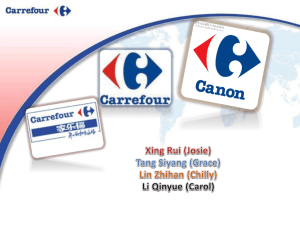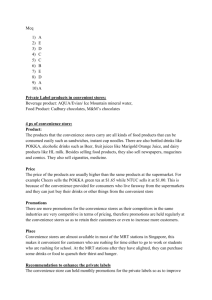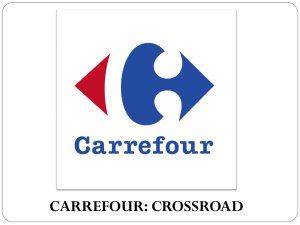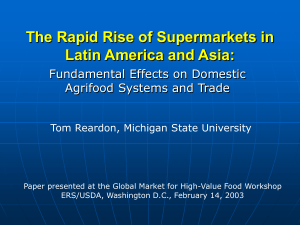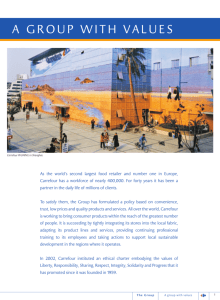Carrefour
advertisement
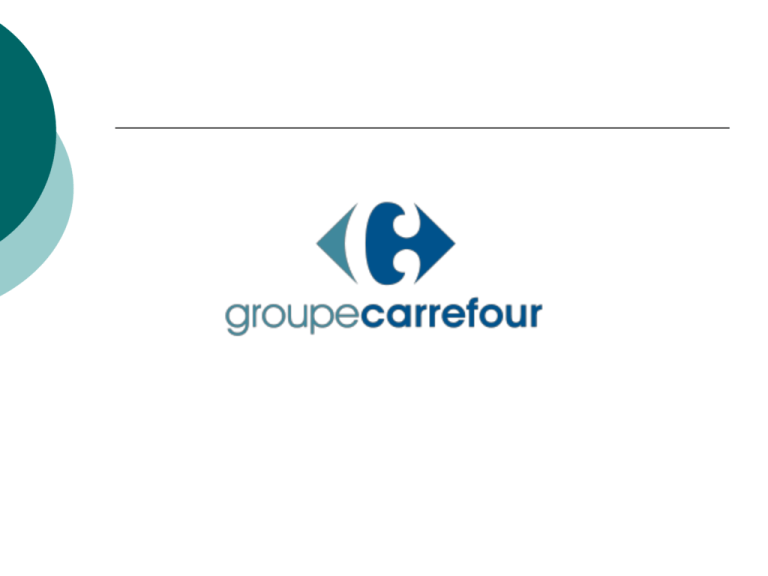
Carrefour Establish in France since 1963. Own over 5200 branch store in 26 countries and region. About 36.3 billion of the sale amount and earn 7 thousand million profit. More than 240,000 thousand employee. The sale feature of Carrefour Hypermarket Various products (including household appliances) Giant size Giant quantities Carrefour in Hong Kong Entrance in 1997 Own 4 branch store in Tuen Mun, Yuen Long, Tsuen Wan, Hang Fa Chuen. Unfortunately, all closed in 2000. Carrefour in Chinese Mainland Entrance in China since 1995. Launch 118 branch store until now. Create great profit in Chinese Market. Question 1. Why do you think that Carrefour withdrew from the H.K. market yet have become very successful in the Chinese mainland? Hong Kong’s situation of Carrefour Marketing segmentation Geographic: 1. Hong Kong is a small city in the world. 2. About 6 million population during 1997 3. In higher population density. 4. The average living size is 450 square feet 5. Less supply of the shops over 100 thousand square feet in the commercial centre. (place for development ???) Hong Kong’s situation of Carrefour Marketing segmentation Demographic: 1. High household income in 1997 but decreasing since 1998 by financial crisis. 2. Higher ratio of rent in the commercial market. Behavioral : 1. Quality and price perspective are equally important. Hong Kong’s situation of Carrefour Marketing segmentation Psychographic: 1. The purposes of shopping in Supermarket of H.K people buy can food, soft drink, groceries. 2. Shopping in wet market everyday for fresh food. 3. Buying household appliances in the other channel e.g. Broadway. 4. Not localize in H.K. Hong Kong’s situation of Carrefour Competitors Parkn Shop Wellcome CRC They Shop create the “price cut ” try to fright back Carrefour. The same destiny of competitor “Grand Mart” Carrefour’s Localization (China Mainland) Buying behavior is the objective Localize their distribution to fit Chinese tastes China is not a totally centralized country Difference region have their own taste and rules Carrefour’s Localization Example 1: Middle & Western China people are more confident of frozen fish than of unfrozen dead fish. Carrefour change the product offered Increase 30-40% sale volume Carrefour’s Localization Example 2: Tsingtao beer is the famous beer brand around the world But in Beijing, Beijing beer is the no.1 brand Carrefour’s Localization Example 3: Panda is the old fashion and low-quality brand in general views But in Nanjing, 35% of television are made by Panda Directly Distribution The marketer reaches the intended final user by distributing the product directly to the customer. There are no other parties involved in the distribution process that take ownership of the product. Question 2: As a manufacturer, why would some Chinese companies engage directly distribution of products in China? What kinds of problems does it reflect in China’s distribution system? Example : GREE (格力電器) Manufacturer consumers No parties involved between each others GREE plays 1. Manufacturer 2. Retailer REASONS 1. Cost 10% to 15% cheaper than others 2. Profit ↑ smooth ordering, packing and delivery without intermediaries 3. Customer loyalty Protection of trademark, patent and copyright REASONS 4. Degree of control take over all aspect transactions ( example , logistics of shipment, collecting payment ) 5. People Power ( Channel Power ) customers feel more secure in doing business with you Problems 1. More Risky lack of information about Chinese culture require the largest involvement in the export process 2. Conflict Boycott of supplies in China Problems 3. Cost ↑ Responsible for every level of organizations Handle all the logistics of the transaction Gome vs Gree Conflicts on pricing strategy between the channel leaders– Manufacturer & Retailer Gree withdrew from Gome to develop a direct distribution (point of sale) In 2007, Gome & Gree both are the market leader in their industries in China Finally they cooperate again! Carrefour Situation A traditional distribution channel Manufactur er Agent Wholesalers Consumer Carrefour Wholesales Market Carrefour Situation Manufactur er A traditional distribution channel Carrefour Consumer Carrefour Situation A traditional distribution channel Manufactur er Carrefour 3 rd parties distributors Consumer For example: Logistic Company Question 3: Base on the Carrefour’s distribution channel, what are the challenges and perhaps strategies for Carrefour? Manufacturers Carrefour The cost of distribution is high Less competiveness Time spend more through many middlemen Manufacturers Carrefour 農村合作社 Carrefour buy from the farmer directly The farmers are responsible for the packaging and transportation as well Shanghai, Wuhan, Beijing and Guangzhou have join the system Manufacturer Carrefour Manufacturers Carrefour The cost of the supply chain have reduced 20 – 30% The cost is much clear Time have saved Protect the quality of food For farmers, their income is increased and guaranteed Vendor Managed Inventory (VMI) Carrefour provides information to suppliers the suppliers take responsibility for maintaining inventory at the Carrefour's store. Carrefour have cooperated with Nestle Benefits of VMI Planning and ordering cost will decrease The overall service level is improved A true partnership is formed between the Supplier and the Carrefour Stabilize the timing of Purchase Orders Share risk The End

